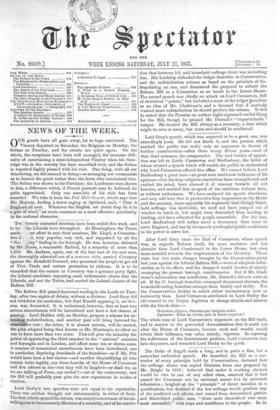Lord Grey's speech, which was expec ted to be a g reat
one, was exceedingly poor. He did not finish it, and the portion which reached the public was really only an argument in favour of further consideration—after these weary fifteen years—and of that dead nuisance, the compounder. The real burden of opposi- tion was left to Lords Carnarvon and Shaftesbury, the latter of whom uttered a speech which will enable the public to understand why Lord Palinerston offered him office. We cannot believe Lord Shaftesbury a great man—no great man could now hold some of his, opinions—but his deep religious convictions have strengthened and exalted his mind, have cleaned it of rancour towards all cut. heretics, and enabled him to speak of the residuum without hate, as without enthusiasm. We have analyzed his speech elsewhere, and may add here that it produced a deep impression on the House and the country, more especially his argument that though house- hold suffrage was inevitable, we need not have jumped out of window to reach it, but might have descended from landing to landing, and have educated the people meanwhile. For the- rest, Lord Shaftesbury will rather serve a democracy than cease to serve England, and has by his speech quadrupled public confidence in his power to serve her.






























